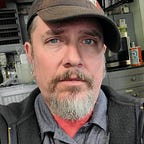No Rain(maker): Death of the House of Magic
I read an article recently announcing the splitting up of General Electric into three separate companies. Living in Louisville and growing up nearish Evendale — the town that GE built in the shadow of Cincinnati for it’s workers at GE Aviation — I took note. I don’t have much to say about the economic implications. True, they’ve lost some market share, but they’re G fucking E and don’t pay a penny of local taxes anyplace they have a footprint — Louisville included.
I don’t have much to say about the stock implications. A lot of people will make money. A lot will probably lose their jobs. But the economic machine limps on like the giant rusty Trojan Horse it’s always been. I’m not thinking about that, either.
I’m thinking about Kurt Vonnegut.
In the 1940’s and 1950’s The House of Magic was the gem of American futurism. If you were a top man in a theoretical field, you wanted to work at GE — that is, if the DOD didn’t pick you up for Cold War Support Staff. Yes GE was making appliances and searching for the ever brighter light bulb but they were also engaged in some of the most purely theoretical and creative work in the history of corporate America. One such project, Project Cirrus, was a rain seeding project worked on by Bernard Vonnegut — Kurt Vonnegut’s brother.
If you haven’t read Ginger Strands bio of the Vonnegut Brothers, you need to. She makes the case that without working at GE and being so close to his genius older brother, Kurt Vonnegut wouldn’t have been… well, Kurt Vonnegut. His time at General Electric and his brother’s work are at the heart of Player Piano and Cat’s Cradle. So much so that in the Science Friday interview, Strand mentions the fact that Vonnegut’s first book, Player Piano, was not sold anywhere publicly in Schenectady, where Project Cirrus was based. Such was the power of the GE: builder of cities, light maker of entire countries, censor of what will eventually be understood as one of the greatest books of the American Half-Century.
Vonnegut’s core concerns in Player Piano — the practical and ethical implications of people’s influence on the environment — were treated like science fiction (read: mislabeled low brow by the New Yorker Literati) then. Now it rings like prophesy.
I don’t mourn the loss of GE, though there are those who probably are. But it is worth noting that Vonnegut, one of American’s greatest writers, was honed in the shadow of one of the world’s largest brands and former economic and cultural monolith.
So it goes.
